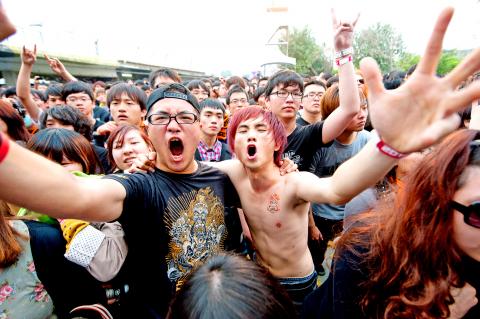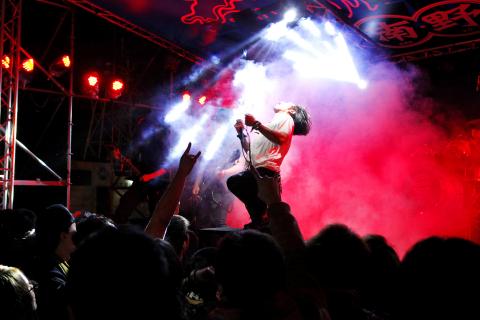Last year, there was a lull in the music festival scene, as two of the biggest rock festivals, Formoz and Megaport went on hiatus. Next weekend, there are two large multi-stage music festivals taking place at the same time, Megaport in Kaohsiung and T-Fest in Taipei.
They occur just one week before Spring Scream, Taiwan’s oldest and most famous music festival, with over 100 bands. It is safe to say, every band and DJ on the island worth seeing will be playing somewhere the last weekend of March or the first weekend of April, and audiences and allegiances will be torn.
In Kaohsiung, Megaport will have 84 acts on six stages, including several metal or punk bands from Japan, including Fact, Alexandros and Straightener and the Hong Kong film star and singer Anthony Wong (黃秋生). There will be more than 70 local Taiwanese bands playing, including indie favorites like LTK Commune (濁水溪公社), the Aboriginal singer-songwriter Panai (巴奈), singer Chen Hui-ting (陳惠婷, formerly of Tizzy Bac) and many more, giving the fest a very local vibe.

Photo courtesy of Tsuji Music
“The festival will reflect the character of south Taiwan, which is a sort of old-style, macho coolness,” says Freddy Lim (林昶佐), the main organizer, who is also lead singer of the metal band Chthonic (閃靈).
T-Fest, being held for the first time, is organized by The Wall and boasts a highly international lineup. It has 57 acts playing on five stages, including a late-night electronic music dance party stage. The lineup includes more than two dozen international acts, including the Danish shoegaze band Mew, US indie band Cloud Nothings and American techno DJ Gunnar Halsam, among others.
So why are both festivals happening on the same weekend?

Photo courtesy of Tsuji Music
Lim says they announced their event dates about a month before T-Fest. “We didn’t want to be so close to Spring Scream,” he says, “but the Kaohsiung government was doing major construction on the event site, so the venue would not have been ready for use in early March, which is the normal time for Megaport. So we had to hold the festival at the end of the month.”
As for T-Fest: “We had decided to do this festival in March quite early on, and since this event is mainly for Taipei, we weren’t so concerned about the overlap,” says Kuma Chen (陳玠安), a spokesperson for The Wall.
“Also, several bands we wanted to book were touring Asia just at this time, so these were just the most convenient dates,” Chen added.
The “T” in T-Fest has multiple meanings — today, tomorrow, Taipei, Taiwan — and has nothing to do with the Taiwanese slang for “lesbian” (“T” is short for “tomboy”).
There are a lot of great bands at both events, though I seriously doubt I’ll be shuttling back and forth on the High Speed Rail to take them all in. My top pick for T-Fest would have to be Turtle Island, which is something like Japan’s answer to the Pogues. Their repertoire draws from Japanese folk songs and they bang with wooden sticks on big, kettle-shaped taiko drums, but they also have mohawks and play with a rowdy punk attitude. Unfortunately, I find T-Fest’s shoegaze headliners fairly boring, but the Japanese post-hardcore group Envy is pretty awesome, and the fest is adding a visual art component to the event, which in theory, sounds interesting.
My “not to be missed” set at Megaport would be LTK Commune, which brings punk attitude to Taiwanese nakashi music and is known to add outrageous stage performances. Flesh Juicer (血肉果汁機) is a young punk band that’s rowdy, loud and fun. The lead singer wears a rubber pig mask, so they are fairly easy to spot. Both are great bands to dance to while spraying Taiwan beer on your friends.
Getting back to the overlap — there is of course a long, complicated backstory to all this.
Lim started Megaport in Kaohsiung 10 years ago, and the festival has grown to become a major music event in south Taiwan, with strong support from the Kaohsiung city government. After a couple early editions to the event, management was handed over to The Wall, which Lim founded with a couple other investors. As Lim began devoting time to his metal band Chthonic and other pursuits, he became less involved in management at The Wall. In 2013, Megaport drew 10,000 fans a day and was a raging success.
Then in late 2013, Lim and The Wall’s other founders were bought out by the CEO, Orbis Fu (傅鉛文). Ownership of festival brands like Megaport and Formoz were reclaimed by Lim, and Megaport took a break last year to reboot. Lim and many of his old colleagues decided to return to organize the event this year, and for the theme, they chose rensheng (人生), which literally means “life,” but with the connotation “that’s life” or “life ain’t easy.”
“It’s the idea that you might come to this music festival and see your ex-girlfriend with another guy,” says Lim. “It’s about moving on and relationships changing, and having a lot of contradictory, confusing feelings.”
So, it is basically about the state of Taiwan’s indie music scene today.
■ Megaport will be held March 28 and 29 from 12pm to 10pm at Kaohsiung’s Pier-2 Arts Center (駁二藝術特區). Advance tickets are NT$1,600 for two-day passes, or NT$900 for single day through www.indievox.com or 7-Eleven iBon. At the gates, tickets will be NT$1,800 for two-day passes, or NT$1,000 for single day. For more info, check: www.megaportfest.com.
■ T-Fest will be held from next Friday to March 29 at Taipei’s Flora Expo Park (台北花博公園). Friday’s performances go from 8pm to 5am, Saturday from 11:40am to 5am, and Sunday from 11:40am to 10:20pm. Two-day tickets are NT$3,800 in advance through FamiPort or at the Wall, or NT$4,200 at the door. Single day passes are NT$2,200 in advance, or NT$3,000 at the door. For info on line-ups and other ticket packages, check: tfest.tw.

April 14 to April 20 In March 1947, Sising Katadrepan urged the government to drop the “high mountain people” (高山族) designation for Indigenous Taiwanese and refer to them as “Taiwan people” (台灣族). He considered the term derogatory, arguing that it made them sound like animals. The Taiwan Provincial Government agreed to stop using the term, stating that Indigenous Taiwanese suffered all sorts of discrimination and oppression under the Japanese and were forced to live in the mountains as outsiders to society. Now, under the new regime, they would be seen as equals, thus they should be henceforth

With over 100 works on display, this is Louise Bourgeois’ first solo show in Taiwan. Visitors are invited to traverse her world of love and hate, vengeance and acceptance, trauma and reconciliation. Dominating the entrance, the nine-foot-tall Crouching Spider (2003) greets visitors. The creature looms behind the glass facade, symbolic protector and gatekeeper to the intimate journey ahead. Bourgeois, best known for her giant spider sculptures, is one of the most influential artist of the twentieth century. Blending vulnerability and defiance through themes of sexuality, trauma and identity, her work reshaped the landscape of contemporary art with fearless honesty. “People are influenced by

The remains of this Japanese-era trail designed to protect the camphor industry make for a scenic day-hike, a fascinating overnight hike or a challenging multi-day adventure Maolin District (茂林) in Kaohsiung is well known for beautiful roadside scenery, waterfalls, the annual butterfly migration and indigenous culture. A lesser known but worthwhile destination here lies along the very top of the valley: the Liugui Security Path (六龜警備道). This relic of the Japanese era once isolated the Maolin valley from the outside world but now serves to draw tourists in. The path originally ran for about 50km, but not all of this trail is still easily walkable. The nicest section for a simple day hike is the heavily trafficked southern section above Maolin and Wanshan (萬山) villages. Remains of

Last week, the the National Immigration Agency (NIA) told the legislature that more than 10,000 naturalized Taiwanese citizens from the People’s Republic of China (PRC) risked having their citizenship revoked if they failed to provide proof that they had renounced their Chinese household registration within the next three months. Renunciation is required under the Act Governing Relations Between the People of the Taiwan Area and the Mainland Area (臺灣地區與大陸地區人民關係條例), as amended in 2004, though it was only a legal requirement after 2000. Prior to that, it had been only an administrative requirement since the Nationality Act (國籍法) was established in